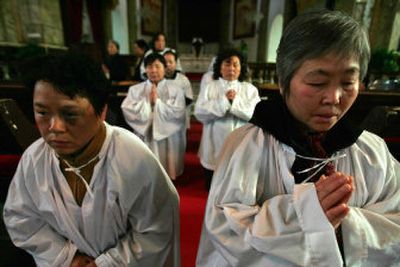Catholics nearing acceptance in China

HONG KONG – After more than half a century of hostility, China and the Roman Catholic Church have inched within reach of normal relations, a historic shift aimed at improving the lives of 10 million Chinese who regularly practice the faith, according to leaders and analysts on both sides of the divide.
The irregular contacts, often at meetings in Rome between Vatican diplomats and Chinese Communist Party officials, remain clouded by mutual suspicion, they said. Party elders particularly fear that the church could become a rallying point for anti-government agitation as it did in Eastern Europe.
But the process has overcome a major stumbling block with recent signals from the Vatican that it is willing to break with Taiwan and set up diplomatic relations with Beijing as part of an overall accord guaranteeing the church’s role in China.
Cardinal Joseph Zen Ze-Kiun of Hong Kong, the senior Roman Catholic cleric in China, said the Vatican’s readiness to drop ties with Taiwan represents a major gain for the Chinese government and is the main motive for Beijing’s decision to soften hostility toward the church. Other analysts noted that the reconciliation talks also fit into a broad effort by China to establish normal trade and other relations with countries around the world, including heavily Catholic nations in Central America whose diplomatic loyalties now lie with Taiwan.
President Hu Jintao repeatedly has displayed interest in the spiritual health of China’s 1.3 billion inhabitants, seeking to fill a void in values left by the abandonment of orthodox communism over the past 25 years. But rather than promote religion, he has sought to steer Chinese back toward traditional Marxist values or has reached deep into history for Confucian guidelines to a healthy society.
Hu’s Communist Party from its founding has opposed religion – it still bars members from religious affiliation – and cracks down ruthlessly on any mix of religion and separatism in Islamic areas such as Xingjiang or Buddhist areas such as Tibet. Against that background, President Bush urged Hu at the White House on Thursday to allow greater freedom of worship.
In any case, the distinction has blurred in recent years between government-sanctioned Catholic churches, which welcome about a third of China’s estimated 10 million Catholics, and the unsanctioned, or underground, churches that claim the loyalty of the other two-thirds. Priests have started moving openly between sanctioned and unsanctioned churches, and local government officials often look the other way at unsanctioned worship as long as it remains focused on religion.
Apart from Taiwan, the other main dispute between Beijing and the Vatican, the power to choose Chinese bishops, has moved close to resolution as well, according to Ren Yanli, a specialist in church-state relations at the government’s Chinese Academy of Social Sciences.
Under an informal but increasingly accepted system, he said, the Chinese government has taken to naming clerics whom it knows already have been named by the Vatican.